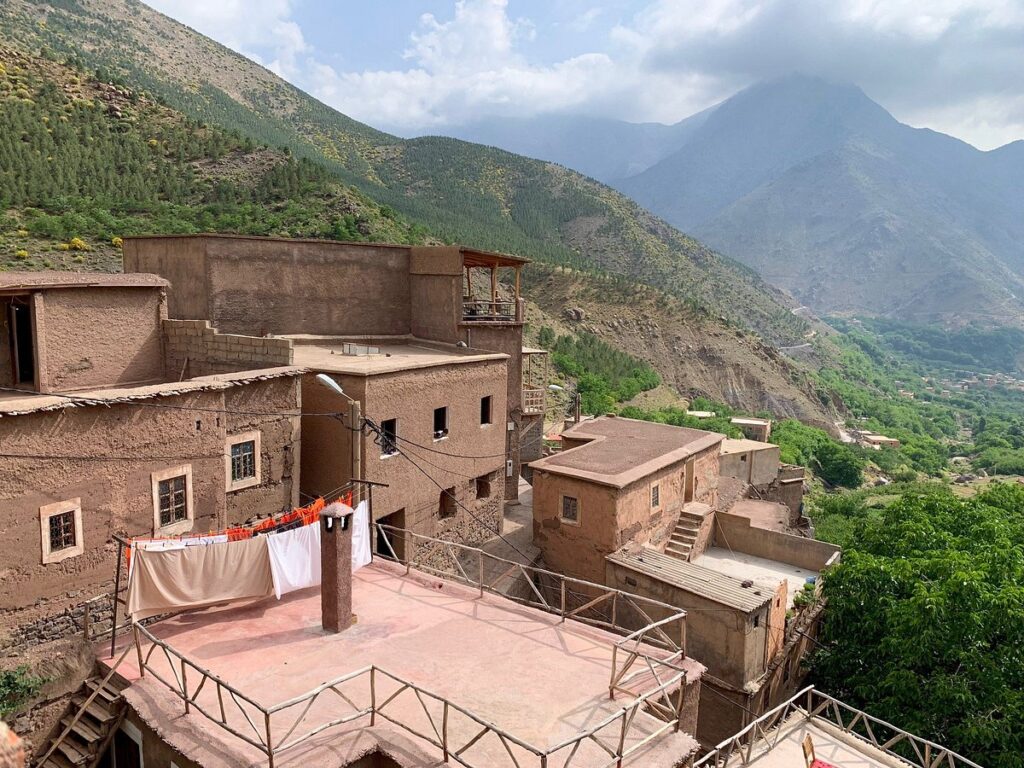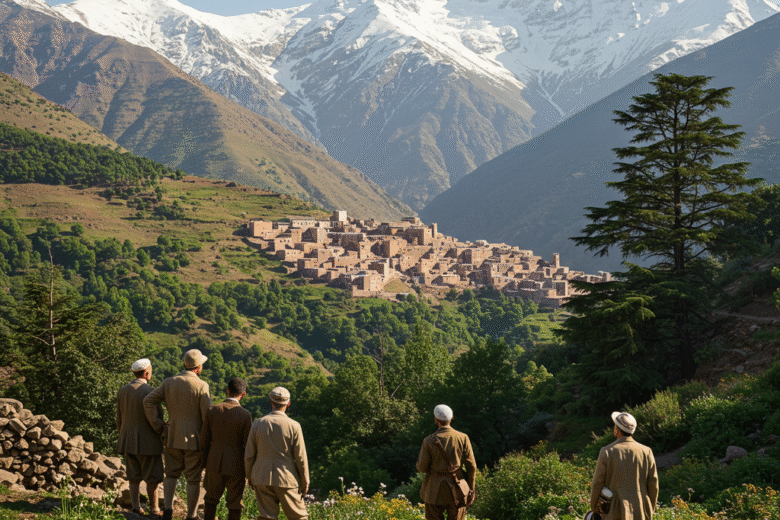Nestled in the High Atlas Mountains of Morocco, Imlil is a charming Berber village that has become a top destination for trekkers, nature lovers, and cultural explorers. Understanding the weather in Imlil is crucial for planning your visit, as the region’s mountain climate can change dramatically with the seasons. Whether you’re heading to Imlil for a Toubkal trek, a peaceful mountain escape, or a scenic day trip from Marrakech, knowing the best time to visit Imlil will ensure you have a safe and enjoyable experience.
Where is Imlil and Why is it Popular?

A Gateway to the Atlas Mountains
Imlil is located about 65 kilometers south of Marrakech, serving as the main base for treks to Mount Toubkal, the highest peak in North Africa. The moment you arrive in Imlil, you’re greeted by the crisp mountain air, narrow paths, walnut trees, and panoramic views. Imlil’s growing popularity comes from its unmatched access to the Atlas Mountains and its tranquil, authentic Moroccan atmosphere.
Overview of Imlil’s Altitude and Terrain

Imlil sits at an elevation of 1,740 meters (5,709 feet) above sea level. This altitude plays a key role in shaping Imlil’s weather, making it significantly cooler than Marrakech year-round. The terrain is mountainous and ideal for hikers, photographers, and anyone seeking an off-the-beaten-path Moroccan experience.
Monthly Weather in Imlil – A Detailed Breakdown
January to March – Snow and Cold Air
In early months, Imlil is often snow-covered, particularly in January and February. Temperatures can drop below freezing at night, while daytime highs hover between 5°C to 10°C (41°F to 50°F). Imlil becomes a snowy paradise and a base for winter mountaineering.
April to June – Spring Blossoms and Ideal Hiking
Spring is one of the best times to visit Imlil. Flowers bloom, rivers flow with melted snow, and hiking trails are lush and green. April brings temperatures between 12°C and 18°C (53°F to 64°F), ideal for trekking. May and June in Imlil are slightly warmer but still pleasant.
July to August – Warm Days and Starry Nights
Though summer in Morocco can be scorching, Imlil stays cool and refreshing due to its high elevation. Expect daytime highs around 25°C (77°F), while nights can dip to 15°C (59°F). This makes Imlil a perfect summer escape from the Marrakech heat.
September to November – Crisp Air and Fall Colors
Autumn in Imlil is stunning. The valleys turn golden, the weather is crisp, and trekking conditions are excellent. Temperatures range from 10°C to 20°C (50°F to 68°F). Imlil in October and November is perfect for those who want beauty without crowds.
December – Winter Returns
By December, snow begins to fall again in Imlil, especially at higher altitudes. It’s a great time for off-season travelers and those preparing for winter Toubkal climbs.
Imlil Temperature by Season

Average Daily Highs and Lows
| Season | High (°C) | Low (°C) |
|---|---|---|
| Winter | 6–12 | -2 to 3 |
| Spring | 13–20 | 4–10 |
| Summer | 22–28 | 12–18 |
| Autumn | 10–21 | 5–11 |
Rainfall and Humidity Trends
Imlil sees most of its rainfall between November and April. The rest of the year is relatively dry, making spring and autumn excellent for outdoor adventures.
Imlil Snowfall in Winter
Snowfall is common from December to March, with higher elevations seeing deep snowpacks, especially on the way to Mount Toubkal.
Best Time to Visit Imlil Based on Activities
Best Time for Trekking and Climbing
- April to June and September to November are the prime months for trekking in Imlil.
- For snow trekking and winter climbing, January and February are ideal.
When to Visit Imlil for Photography
Photographers will love April (blossoms) and October (fall colors) in Imlil. Crystal-clear skies and dramatic mountain backdrops make every shot count.
Imlil for Cultural and Village Experiences
Summer months are best to see Imlil’s village life in full swing—open markets, festivals, and friendly locals fill the valley with life.
What to Pack for Imlil Based on Weather

Clothing for All Seasons
Packing for Imlil depends heavily on the time of year you plan to visit. Here’s what to bring:
- Winter (Dec–Feb): Thermal base layers, insulated jackets, waterproof hiking boots, gloves, and hats. Imlil gets cold, especially at night.
- Spring & Autumn (Mar–May & Sep–Nov): Layered clothing, light fleece, windproof jacket, and sturdy hiking shoes. Evenings in Imlil are chilly.
- Summer (Jun–Aug): Breathable clothing, sunhat, sunglasses, sunscreen, and a light jacket for the cool nights in Imlil.
Gear Essentials for Trekkers and Hikers
- Trekking poles (essential for Toubkal climbs)
- Daypack with hydration system
- Rain cover or waterproof shell
- Flashlight or headlamp
- First-aid kit
- Map of Imlil and its trails
Imlil Weather vs Marrakech Weather

Temperature Difference Explained
Visitors are often surprised to find that Imlil is significantly cooler than Marrakech, despite being only 1.5 hours away by car. This difference is due to Imlil’s elevation (1,740 m), while Marrakech lies near sea level.
In summer:
- Marrakech: 38°C (100°F)
- Imlil: 25°C (77°F)
In winter:
- Marrakech: 17°C (62°F)
- Imlil: 8°C (46°F), with snow in the mountains
How Altitude Affects Imlil’s Climate
Imlil’s high altitude means:
- Cooler temperatures year-round
- Greater diurnal range (warm days, cold nights)
- More precipitation in winter, especially snow
This makes Imlil an ideal retreat from the Moroccan heat and a unique environment for mountaineers and nature lovers.
FAQs About Imlil Weather & Travel Timing
Does Imlil get snow?
Yes, Imlil receives snow every winter, usually from December through March. Snow is more common at higher altitudes like Toubkal base camp.
Is Imlil too hot in summer?
Not at all. Imlil stays cool and pleasant in summer, with average highs between 22°C and 28°C. It’s a popular escape from Marrakech’s scorching heat.
Can I visit Imlil in winter?
Yes, but you’ll need warm clothing and possibly crampons or snow gear for treks. The village remains accessible unless snow blocks the roads temporarily.
Is Imlil suitable for kids year-round?
Absolutely. Imlil is family-friendly, especially in spring and summer. Avoid winter if you’re traveling with very young children unaccustomed to cold weather.
What’s the coldest month in Imlil?
January is usually the coldest, with freezing nights and potential snow even at village level.
Is Imlil open during Ramadan?
Yes, Imlil stays open, and locals continue offering services, though restaurants may adjust hours, and it’s respectful to avoid eating in public during fasting times.
Conclusion – Plan Your Imlil Journey with the Weather in Mind
Imlil is a truly unique destination where the mountains meet culture, and the climate shapes the experience. From snowy winter climbs to breezy summer treks and colorful autumn walks, Imlil offers something extraordinary every season. Understanding Imlil’s weather patterns not only helps you prepare but also lets you align your visit with the experiences you want most—whether that’s summiting Toubkal, photographing Berber villages, or sipping mint tea with a view.
Plan your trip around the best time to visit Imlil, and you’ll discover why this high-altitude haven has become one of Morocco’s most unforgettable travel gems.
By JobHijra


1 Comment